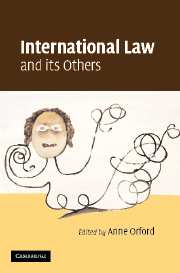Book contents
- Frontmatter
- Contents
- Acknowledgments
- Notes on the contributors
- 1 A jurisprudence of the limit
- PART I Sovereignty otherwise
- PART II Human rights and other values
- 6 Reassessing international humanitarianism: the dark sides
- 7 Trade, human rights and the economy of sacrifice
- 8 Secrets of the fetish in international law's messianism
- 9 Human rights, the self and the other: reflections on a pragmatic theory of human rights
- PART III The relation to the other
- PART IV History's other actors
- Index
7 - Trade, human rights and the economy of sacrifice
Published online by Cambridge University Press: 20 July 2009
- Frontmatter
- Contents
- Acknowledgments
- Notes on the contributors
- 1 A jurisprudence of the limit
- PART I Sovereignty otherwise
- PART II Human rights and other values
- 6 Reassessing international humanitarianism: the dark sides
- 7 Trade, human rights and the economy of sacrifice
- 8 Secrets of the fetish in international law's messianism
- 9 Human rights, the self and the other: reflections on a pragmatic theory of human rights
- PART III The relation to the other
- PART IV History's other actors
- Index
Summary
Desiring to further the use of harmonized sanitary and phytosanitary measures between Members …
This need to enter into a relation with someone, in spite of or over and above the peace and harmony derived from the successful creation of beauty is what we call the necessity of critique.
There is a great deal of institutional energy in the field of international law currently channelled into a debate about the relationship between trade and human rights. Much of this literature focuses on the human rights effects of the World Trade Organization and the trade agreements negotiated and implemented under its auspices. Texts dealing with this question can be found in activist essays, scholarly literature and the reports of international institutions. Most such texts engage with the substantive content of trade or human rights law. The end of such scholarship is to produce an account of the best way to achieve a particular normative commitment, such as justice, efficiency, economic integration, human dignity or the rule of law. This chapter pauses to reflect upon a prior question: what are the forms of law which transmit, frame or accompany these substantive obligations and normative commitments? Focusing on this question of the forms of law embodied in the two fields of trade and human rights is helpful, perhaps even necessary, in developing an understanding of the relationship of liberal democratic politics to global capitalist economics.
- Type
- Chapter
- Information
- International Law and its Others , pp. 156 - 196Publisher: Cambridge University PressPrint publication year: 2006
- 5
- Cited by



